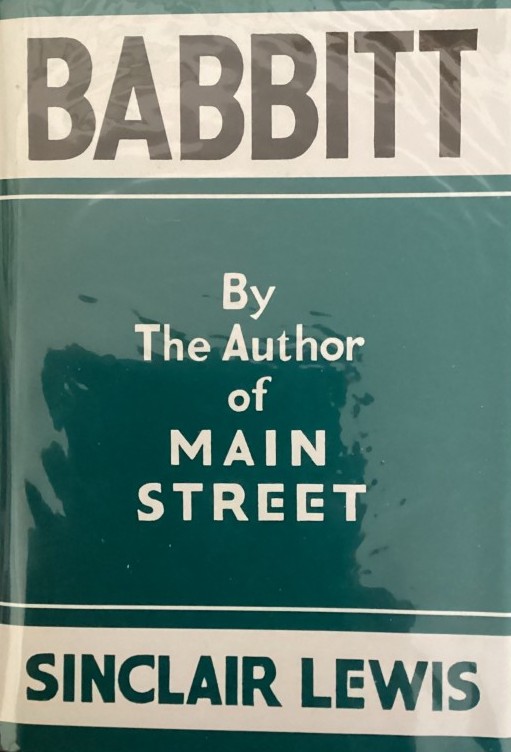Inspiring Older Readers
 posted on 30 Sep 2024
posted on 30 Sep 2024
Babbitt by Sinclair Lewis
Comparatively few novelists create a protagonist whose characteristics chime so perfectly with a social or economic phenomenon that the name enters the language as useful shorthand. But this is exactly what happened with Sinclair Lewis’s 1922 creation, George F. Babbitt. Essentially a satire on the growing, deeply conservative and conformist middle-classes, the novel’s popularity almost certain weighed heavily in the considerations of the judges who awarded Lewis the Nobel Prize for Literature in 1930 and Webster’s Dictionary added this definition of ‘a Babbitt’ to their lexicon:
" (a)person and especially a business or professional man who conforms unthinkingly to prevailing middle-class standards"
This isn’t a book packed with action or events – quite the opposite because this is a journey into the mind of a man who consciously wants to conform but subconsciously wants to believe that life can be more interesting and fulfilling. He’s approaching middle-age, smokes too many cigars, is married to the compliant Myra, has three children (10, 17 and 22) and works in real estate. He’s a little overweight, a cultural philistine, finicky and totally convinced of his own ‘rightness’ and lives in the suburban community of (the fictional) Zenith where he’s seen as a bastion of rectitude.
But Lewis tells us, bubbling away under the surface, Babbitt isn’t entirely happy and his soul isn’t quite dead – just seemingly irrevocably trapped in the corset of conformity. Babbitt often has dreams of his ‘Fairy Girl’ who will whisk him into a world of fulfilled bliss while his eldest daughter flirts with what he thinks are dangerous ‘Socialist’ ideas and his 17 year-old son would rather mess with engines than study academically in the way Babbitt would value as appropriate to his middle-class status.
Babbitt’s emotional world is supplemented by his unquestioning friendship with Paul Reisling, a friend from his school days who was a promising musician but who abandoned his talent to set up a tar-roofing business to provide for his slightly blousy wife, Zilla. Babbitt treats Paul as something of a possession and his complete dedication to his friend blinds him to Paul’s deteriorating state of mind as the marriage with Zilla spirals into dangerous abuse.
Babbitt’s time with Paul – fishing trips with his friend and without his wife – are used by George as a sort of safety valve for his emotions but when Paul is arrested for shooting his wife in the shoulder following yet another terrible row, the centre of Babbitt’s world cannot hold.
Suddenly left without his friend, Babbitt’s conservative armour is breached and, to the consternation of all around him, he begins to espouse suspiciously liberal attitudes and values. He even begins to believe his dream ‘fairy girl’ can be made a reality and begins an affair with a client who comes to him in search of an apartment to move into. He even starts consorting with known Socialists!
But conservative karma is almost instant as his reputation, his business and his standing in Zenith all start to plummet. Babbitt’s transgressions are further underlined (or maybe punished) when his long-suffering wife falls dangerously ill.
Confronted by the unbearable family and social pressures, Babbitt bolts back to the safety of his reactionary world. But, Lewis suggests, his brush with the world of liberal thinking has left a mark – at the end of the book he takes his son aside and tells him that if he wants to be an engineer, he should follow his dreams.
Some critics have argued that the portrait of Babbitt is less a satire and more a caricature and in the first half of the book I think there’s some justice in that. But, as the book progresses, Babbitt and his world becomes multi-dimensional and subtle.
I very much enjoyed this and I was struck by how relevant it feels today for anyone who watches the US from across the Atlantic and struggles to understand how they can be both the home of extreme conservatism and the home of remarkably progressive forces at one and the same time.
Paperback copies are easy to find and you should pay over £10 for a copy.
Terry Potter
September 2024